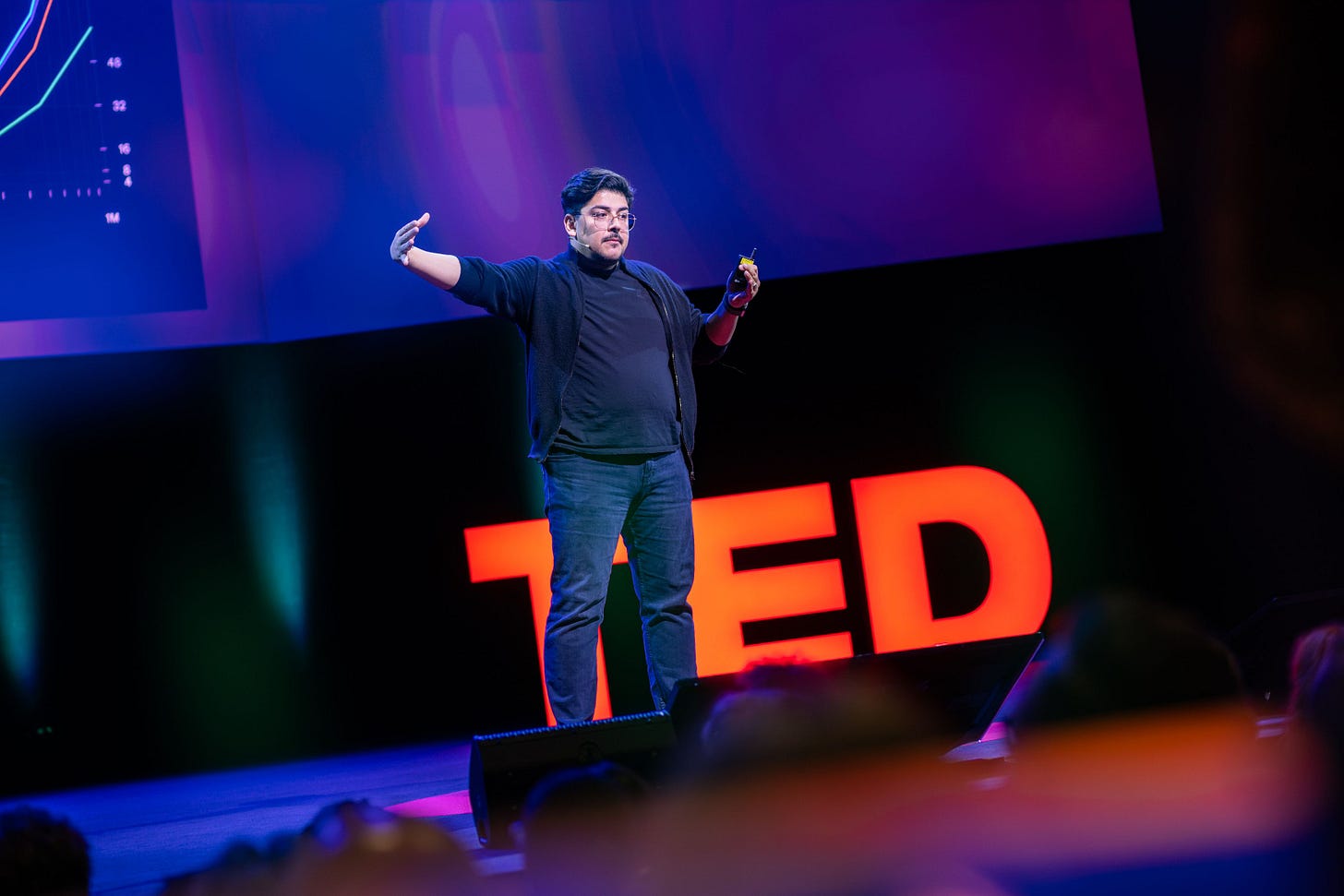Liquid AI achieves worm-level AGI; kids are making their own LLMs; OpenAI readies GPT-4 successor; Europe's Fortune 100 meets AI; Google open sources AI text watermarking tool
Business Insider publishes the AI Power List; mother says AI chatbot led her son's suicide; Waymo exec discusses self-driving advances; UCL spinout aims to reduce data center energy consumption
Yann LeCun said we’re still years away from AI achieving the level of intelligence of a house cat. But can today’s AI be as smart as a worm?
Liquid AI, a startup spun out of MIT, believes so. Inspired by the brain of the Caenorhabditis elegans roundworms found in soil environments, Liquid AI’s founders have built a new generation of multimodal AI models designed to be more efficient and capable than traditional LLMs, especially those based on the transformer architecture.
These new models are called Liquid Foundation Models (LFMs) and achieve better performance than other language models of the same size. For example, the LFM-1B version outperforms other 1 billion parameter models and is the first non-GPT architecture to significantly beat transformer models from Meta, Microsoft or Google. The LFM-3B even outperforms older 7B and 13B models, delivering the same high-quality results you’d get with a traditional LLM while using less computing power and memory.
One of the main advantage of LFMs are their context window. Imagine trying to remember a long conversation or read a lengthy document; it gets difficult to keep track of everything. Traditional LLMs have a similar issue. They struggle with long sequences of information. LFMs are designed to efficiently compress inputs, allowing them to handle longer sequences without requiring as much memory. This makes them ideal for tasks like analyzing lengthy documents, having deeper conversations with chatbots, and improving information retrieval systems.

Instead of relying solely on the transformer architecture, LFMs are designed using principles from dynamical systems, signal processing, and numerical linear algebra. LFMs use special computational units organized in "depth groups" and "featurizer interconnections," which helps them maximize performance with minimal computational resources. While regular neural networks are defined by weights (static values that affect the relationships between neurons), LFMs take a different approach, using adaptive linear operators that respond to the input data, making them more flexible and capable of handling complex tasks. They're therefore designed to be scaled up or down depending on the task, giving developers more control over how the models behave and making them suitable for various applications from small edge devices to large servers, including fraud detection, self-driving cars or computational biology.
LFMs represent an interesting advancement in am increasingly crowded and commoditized AI market dominated by vanilla, transformer-based LLMs. Liquid AI’s founders offer a fresh perspective on how to build powerful and efficient AI models, and I’m genuinely interested to see how their technology will perform in the real world.
And now, here are the week’s news:
❤️Computer loves
Our top news picks for the week - your essential reading from the world of AI
MIT Technology Review: Kids are learning how to make their own little language models
Business Insider: The 2024 AI Power List
The Verge: OpenAI plans to release its next big AI model by December
New York Times: Can A.I. Be Blamed for a Teen’s Suicide?
MIT Technology Review: Google DeepMind is making its AI text watermark open source
TechCrunch: Investments in generative AI startups topped $3.9B in Q3 2024
The Atlantic: The Age of AI Child Abuse Is Here
Fortune: Investors pour into photonics startups to stop data centers from hogging energy and to speed up AI
Fortune: Waymo engineering exec discusses self-driving AI models that will power the cars into new cities
FT: Google DeepMind’s Demis Hassabis on his Nobel Prize: ‘It feels like a watershed moment for AI’
FT: How AI groups are infusing their chatbots with personality
⚙️Computer does
AI in the wild: how artificial intelligence is used across industry, from the internet, social media, and retail to transportation, healthcare, banking, and more
The Guardian: Talk to your plants? Now the first AI-powered garden will allow them to talk back
TechCrunch: Anthropic’s AI can now run and write code
Reuters: How AI can help the food sector to meet new deforestation rules
Business Insider: The AI app Soula seeks to improve healthcare access for pregnant women
TechCrunch: Zoom partners with Suki to offer AI-powered medical note-taking
Fortune: Luminance debuts AI assistant for lawyers that’s aimed at doing some of the legal grunt work
The Atlantic: What Does That Bark Mean?
TechCrunch: Midjourney plans to let anyone on the web edit images with AI
🧑🎓Computer learns
Interesting trends and developments from various AI fields, companies and people
VentureBeat: Cohere launches new AI models to bridge global language divide
Sifted: Synthesia has quadrupled its team since 2022 to push for a 'ChatGPT-style' moment in AI video
TechCrunch: Google adds new disclosures for AI photos, but it’s still not obvious at first glance
Forbes: This AI Startup Wants To Free Sales Reps From The Pains Of Cold Calling
The Information: Chinese Apps Notch Early Wins in AI Video
VentureBeat: Meta just beat Google and Apple in the race to put powerful AI on phones
FT: Meet Joelle Pineau: shaping AI as the world grapples with its potential
Fortune: ‘Can AI be an artist?’ A Sotheby’s auction tests the answer, while human artists protest AI training
Business Insider: This staid software company is kicking butt in AI. The CEO explains how.
Semafor: AI firms need to address security, open-source concerns: G42 exec
The Information: The Startup Fueling OpenAI and Anthropic’s Coding Race
The Information: OpenAI, in Duel With Anthropic, Doubles Down on AI That Writes Software
The Information: OpenAI Winds Down ‘AGI Readiness’ Team as Policy Leader Exits
WSJ: Perplexity CEO Proposes Revenue Deals for Publishers After Lawsuit
VentureBeat: OpenAI scientist Noam Brown stuns TED AI Conference: '20 seconds of thinking worth 100,000x more data'
VentureBeat: Cohere adds vision to its RAG search capabilities
VentureBeat: ‘This is a game changer’: Runway releases new AI facial expression motion capture feature Act-One
AP: Chipotle’s new AI recruiter aims to cut hiring time by 75%
The Verge: Microsoft and OpenAI are giving news outlets $10 million to use AI tools
Bloomberg: OpenAI Hires Former Uber Executive as Chief Compliance Officer
Reuters: OpenAI hires ex-White House official as chief economist
Reuters: Facebook owner Meta restarts facial recognition tech in 'celeb-bait' crackdown
TechCrunch: Marc Andreessen says AI model makers are in ‘a race to the bottom’ and it’s not good for business
TechCrunch: Stability claims its newest Stable Diffusion models generate more ‘diverse’ images
Axios: How on-device AI could shake up the phone app business
VentureBeat: AI startup Ideogram launches infinite Canvas for manipulating, combining generated images
VentureBeat: Generative AI grows 17% in 2024, but data quality plummets: Key findings from Appen’s State of AI Report
VentureBeat: AI video startup Genmo launches Mochi 1, an open source rival to Runway, Kling, and others
FT: Anthropic says latest AI model can control users’ computers
Business Insider: Marc Benioff says Microsoft rebranding Copilot as AI 'agents' shows they're in 'panic mode'
MIT Technology Review: Would you trust AI to mediate an argument?
VentureBeat: Gartner: 2025 will see the rise of AI agents (and other top trends)
VentureBeat: Meta Introduces Spirit LM open source model that combines text and speech inputs/outputs
TechCrunch: Gusto’s head of technology says hiring an army of specialists is the wrong approach to AI
TechCrunch: xAI, Elon Musk’s AI startup, launches an API
New York Times: Microsoft and OpenAI’s Close Partnership Shows Signs of Fraying
The Information: Can Greg Brockman Find a Future Back at OpenAI?
Reuters: IBM releases new AI models for businesses as genAI competition heats up
Reuters: Honeywell partners with Google to integrate data with generative AI
Reuters: Portugal could boost productivity if third of workforce trained in AI, study shows
FT: Chinese AI groups get creative to drive down cost of models
AP: Want employees to embrace AI? A Slack exec says knowing the 5 AI personalities is key
The Atlantic: The AI Boom Has an Expiration Date
MIT Technology Review: The race to find new materials with AI needs more data. Meta is giving massive amounts away for free.
Business Insider: Google Research execs reveal how they use AI in their daily lives — and where they think twice about it
The Guardian: Microsoft introduces ‘AI employees’ that can handle client queries




